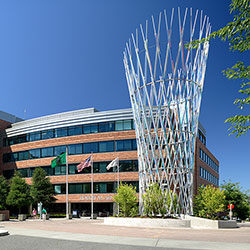Lab Members
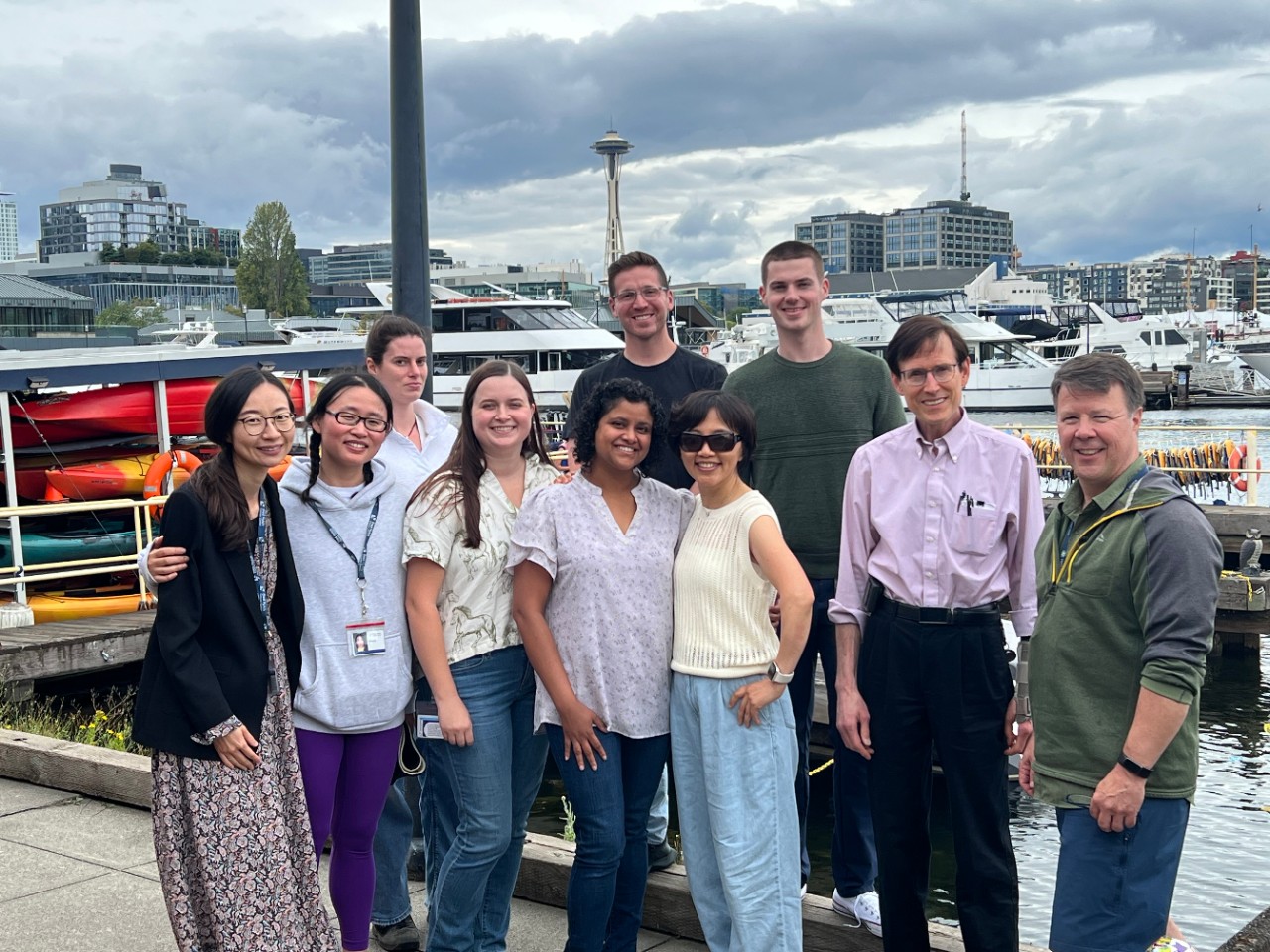
From left to right (starting with the front row) is Jin-Hee Kim, PhD; Sherry Qi, PhD; Victoria Cannon; Sophia Noehl-Tekorius; Namita Hattangady, PhD; Ming Yu, PhD; Bill Grady, MD; Tom Paulson, PhD; and in the background are Kelly Carter, and James Nolan.

William Grady, MD
Member, Clinical Research and Public Health Sciences Divisions, Fred Hutch
Medical Director, GI Cancer Prevention Program Clinic, Fred Hutch
BS, University of Michigan, Ann Arbor
MD, University of Michigan, Ann Arbor
Dr. Grady is a molecular and cell biologist and board-certified gastroenterologist. He is an independent NIH funded principal investigator with more than 20 years of experience in basic, translational and clinical research related to gastrointestinal (GI) cancer. Grady is co-head of the GI Cancer Program of the Fred Hutchinson Cancer Center/University of Washington Comprehensive Cancer Center and the director of Translational Research for the Gastroenterology Division at the University of Washington.
In his role as a practicing gastroenterologist, Grady manages patients with a variety of gastrointestinal diseases including Barrett's esophagus, colon polyps and cancer. As medical director of the GI Cancer Prevention Program Clinic he specializes in the care of individuals who have cancer family syndromes, including Lynch syndrome and polyposis syndromes. He is a principal investigator of the Early Detection Research Networks (EDRN) Biomarker Characterization Centers, an OncoAging Consortium Center, and a Center for the Translational Biology of Early Lesions (TBEL) Consortium. His laboratory studies the molecular and cellular biology of gastrointestinal cancers and the translational application of these findings into the clinic.
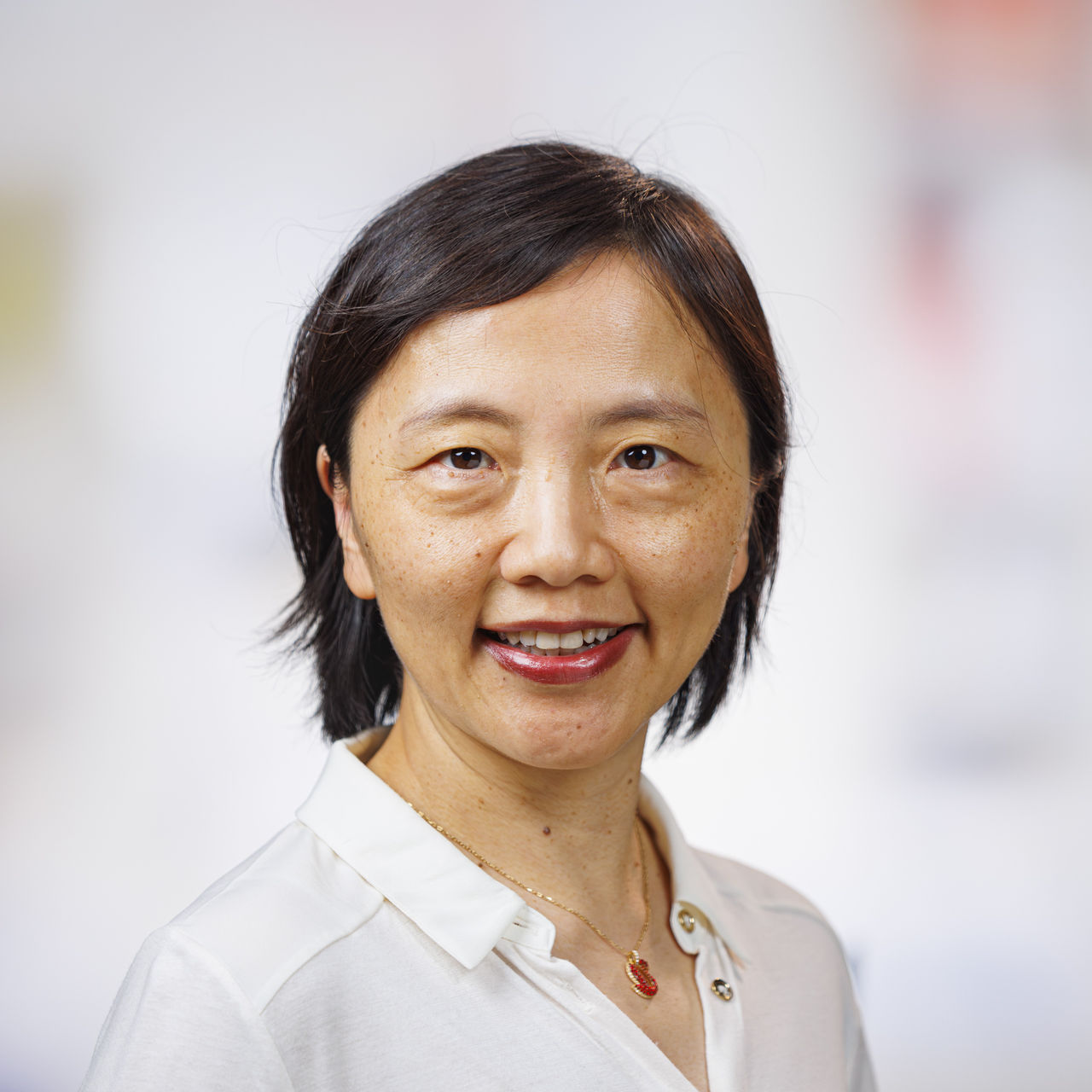
Ming Yu, PhD
Bachelor and Master of Bioengineering, Jiangnan University, China
Master of Microbiology, North Carolina State University
PhD, Curriculum in Dental Biology, Department of Genetics, University of North Carolina at Chapel Hill
Dr. Ming Yu is a Principal Staff Scientist with expertise in cancer epigenomics to make discoveries in translational research, and support multi-disciplinary research programs using innovative approaches. Currently, her research focuses on understanding the molecular pathogenesis of cancer with an emphasis on epigenetic alterations, in particular DNA methylation changes, in gastrointestinal malignancies. She has established a foundation and track record leading to a successful research program, aiming to uncover the functional roles of DNA methylation during tumorigenesis and to discover novel DNA-methylation-based biomarkers for the detection and diagnosis of cancer. Her academic training thus far has given her a strong background in bioengineering and molecular biology; her 12+ years of hands-on translational research experience has provided her with a full spectrum of skill sets working with mouse models, 2-D cell cultures, 3-D patient-derived organoid cultures, patient-derived xenografts, and clinical samples. She has been the primary scientist in multiple research programs, including the Early Detection Research Network, the Barrett’s Esophagus Translational Research Network, a Bridging The Gap UO1 (Multiscale Esophageal Cancer Model), and PQ RO1 (Accelerated Biological Aging and Colon Polyp to Cancer Progression;Radiogenomics of colorectal polyps to assess benign proliferative vs. premalignant states). She is the PI of an NCI-funded R50 research program to study translational epigenomics in GI cancer.

Thomas Paulson, PhD
Bachelor of Science in Education, Northwestern University, 1988
PhD, Molecular Biology and Genetics, Department of Biology, University of California, San Diego, 1996
Dr. Thomas Paulson is Senior Staff Scientist who has been performing research on Barrett’s esophagus at the Fred Hutchinson Cancer Center since 1997. His research interests involve the development of genomic instability and genetic and epigenetic alterations during the evolution of cancer, using Barrett’s esophagus and its development into esophageal adenocarcinoma as a model system. He has published studies identifying characteristic genomic changes that can be used as biomarkers of risk of progression to cancer, including gene mutations, copy number changes and aneuploidy, as well as ecological measures that indicate how cancer cells develop and evolve over time and space in the esophagus. Through his work with Dr. Brian Reid and the Seattle Barrett’s Esophagus Program he has also investigated how lifestyle factors, including diet, exercise and medication use may affect the risk of progressing to cancer.
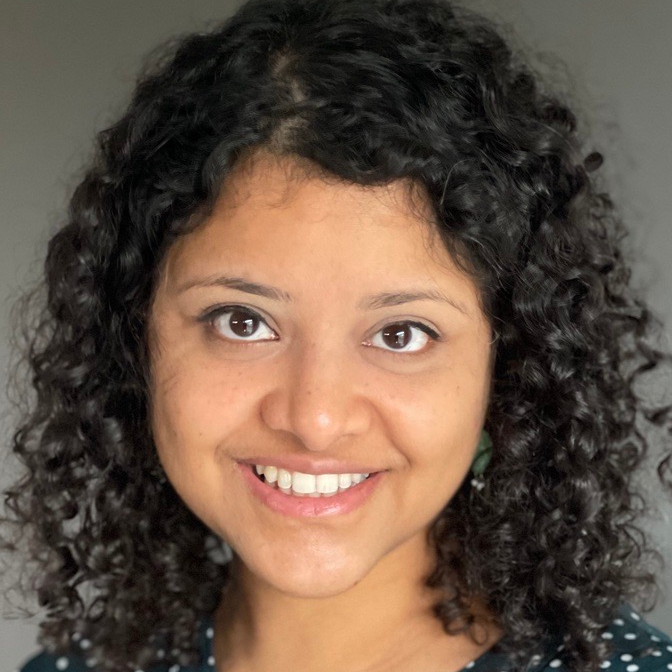
Namita Hattangady, PhD
Dr. Namita Hattangady is a Postdoctoral Research Fellow with 14+ years of translational research in tumor biology. Namita joined the Grady Lab in 2019, after working on adrenal tumors at the University of Michigan, Ann Arbor. She enjoys collaborative research and, with the support of the Interdisciplinary Training Grant in Cancer Research, investigates the role of the tissue microenvironment in the onset and progression of colorectal cancer. Along with the Grady Lab, Namita has been involved in exploring the use of spatial transcriptomics and profiling in understanding mechanisms in colon cancer. Namita’s long-term career goals are to use her expertise in the advancement of cancer therapeutics, cancer prevention, and biomarker development. Outside of the lab, Namita enjoys Indian classical music, cooking, hiking, and spending time with her family.
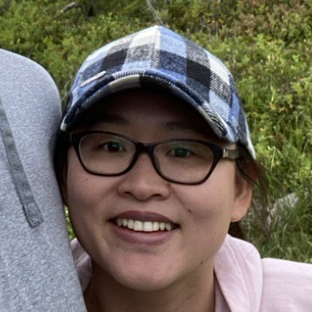
Sherry Qi, PhD
Sherry is a post-doc research fellow in Grady Lab, the main focus of her research is studying the DNA methylation status in different groups of polyps via bioinformatics analysis. She is a Ph.D. holder in Chemical Engineering from Iowa State University with a bachelor degree in Biochemistry and minor in Statistics, combining a robust academic background with extensive expertise in molecular genetics, genomics, and bioinformatics. She has showcased a deep understanding of complex scientific concepts, as demonstrated in the thesis on "Intestinal Stem Cells with its Applications." Proficient in programming languages like R, with additional skills in Python, SQL, GitHub, and shell scripting, Dr. Qi excels in creating engaging data visualizations and harnesses a comprehensive knowledge of bioinformatics tools.
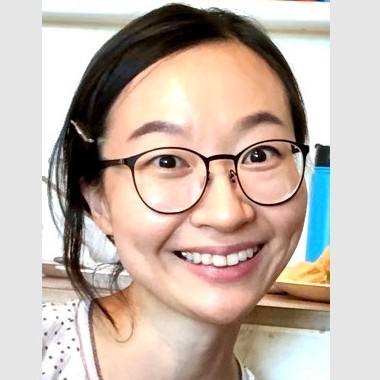
Jin-Hee Kim, PhD
PhD, Seoul National University, South Korea
Dr. Jin-Hee Kim joined the Grady Lab in July 2024. Her research interests include studying how the cellular senescence tissue microenvironment induces colorectal cancer and how to prevent the oncogenic event by changing the senescence microenvironment. Before joining the Grady lab, she studied DNA damage, cancer prevention and therapeutic drugs, and senescence-associated secretory phenotypes through in vivo and in vitro experiments with mesothelioma at the University of Hawaii Cancer Canter. She likes to read literature and introduce new techniques, such as spatial transcriptomics, to her research. In her spare time, Jin enjoys camping with family and friends.

Kelly Carter
Kelly joined the Grady Lab shortly after graduating from the University of Washington in 2009. As a lifelong resident of the region Kelly grew up hearing about the work done at the Hutch and feels a strong connection to the culture and mission of Fred Hutch.
Kelly has had the opportunity to work on a variety of projects during his time in the Grady Lab. His current work is focused in three main areas: Age related methylation in the colon, risk markers for cancer initiation and progression in the colon, and the expansion of the Grady Lab's extensive methylation array dataset.

Victoria Cannon
Victoria has been a research technician in the Grady lab since 2020. Her primary focus is the study of DNA methylation changes in Barrett’s esophagus, high grade dysplasia, and esophageal adenocarcinoma which can be leverage in the design of molecular assay for early cancer detection. When not in the lab, Victoria can be found walking her German shepherd Rizer, and renovating her home with her husband.

Sophia Noehl-Tekorius
Sophia is a research technician in the Grady lab who works closely with principal staff scientist Dr. Ming Yu on several projects focusing on the relationship between senescence and colorectal cancer, with an emphasis on patient-derived 3D cell culture of colon organoids. A lifelong resident of the Pacific Northwest, she moved to Seattle from the Portland area in 2018, and joined the lab in August 2022. In her spare time Sophia enjoys exploring the restaurants of Seattle, and spending time outside through paddle boarding in the summer, skiing in the winter, and horseback riding year-round.
Lena Allen
Lena is a bioinformatics intern and master’s student in the University of Oregon’s Knight Campus Graduate Internship Program. Originally from the state of Georgia, she is enjoying her time in the pacific northwest. When she isn’t coding, Lena enjoys playing the drums and guitar, attending live music shows, and doing arts and crafts!

Quynh Do, PhD
Dr. Quynh Do is a Post-Doctoral Research Fellow who is applying multi-omics approach to characterize the molecular mechanism underlying the progression of adenoma into advanced adenocarcinomas. Quynh moved to the U.S from Vietnam 10 years ago and felt in love with science research. After getting her Ph.D. in Medicinal Chemistry from the University of Washington, Quynh decided to join the Grady lab at Fred Hutch to further advance her research experience in cancer biology and translational research. Quynh’s long-term career goal is to become a translational scientist with a focus on biomarker discovery for cancer early detection and prognosis. When not in lab, Quynh enjoys cooking and spending time outdoors either playing tennis or hiking with her two fur babies Genji and Huey.

Jessica Ayers
BS, Major: Integrative Biology
Minors: Political Science, Environmental Sustainability
University of Illinois at Champaign-Urbana
Jessica is a research technician in the Grady Lab who originally hails from the Chicago-land area. She works closely with principal staff scientist Dr. Ming Yu on many projects including methylation biomarkers aimed at detecting Barrett’s Esophagus and Esophageal Adenocarcinoma. When she is not in the lab she can be found skiing at Snoqualmie or cheering on the New England Patriots.

Andy Kim
Andy is a Research Intern at the Grady Lab. He currently studies Engineering at the University of Washington and works on many different projects with Research Technician Jessica Ayers such as Cell Signaling and G418 Selection.

Amber Willbanks
BA, Cell, Molecular, and Genetic Biology
Boston University
Amber began working with the Grady lab in October 2017. She uses molecular platforms to study epigenome/methylation changes as they correlate with BE and HGD/EAC for biomarker discovery and development.

Ting Wang
BE, Automatic Control, Department of Automation, Tianjin University, Tianjin, China (2005)
PhD, Bioinformatics, Department of Automation, Tsinghua University, Beijing, China (2009)
Postdoctoral Associate, Department of Pediatrics, University of Pittsburgh, Children’s Hospital of Pittsburgh of UPMC, Pittsburgh, PA (2014)
Dr. Wang is a computational biologist and bioinformatician. His research interests include personalized and precision medicine, multi-omics study of complex diseases for diagnosis and therapy, development and application of statistical and machine learning methods in computational biology. He has plenty of experience in high throughput sequencing (RNA-seq, Chip-seq, ATAC-seq, bisulfite sequencing, small-RNA sequencing, single cell sequencing) and microarray (gene expression, DNA methylation) data analysis, network and pathway analysis.
Dr. Wang Joined Dr. Grady’s lab at Fred Hutchinson Cancer Research Center in August 2018. His work focuses on computational study of epigenome/methylome, transcriptome and genome in the colon to explore the biological mechanisms of epigenetic ageing and discover cancer risk biomarkers.
Personal homepage: https://sites.google.com/site/tingwanghome/

Huichuan Yu
MD, Zhongshan School of Medicine
Sun Yat-sen University
Dr. Yu was a board-certified colorectal surgeon, but he has turned to serve as a molecular biologist. His current research interests include developing novel assays and technologies to quantify epigenomic and epitranscriptomic features, the systematic alterations in the genome and epigenome of colorectal cancer patients, the role of G-quadruplex DNA in the perturbation of transcription, splicing and replication, and repurposing the CRISPR/Cas9 system for targeted epigenome editing and DNA secondary structure folding.

Sheyu Lin
The research field mainly include the following aspects: Firstly, the research work was carried out following teacher Liumei’s instruction and the work closely related to nerve regeneration; Then, I started PhD study period and the research focused on the classical genetics and epigenetics. The work mainly included the analysis between the cerebral palsy and associated genes and the mechanism behind the cancer occurrence, development such as breast cancer and hepatocellular carcinoma. After I graduated from Fudan University, the research within cancer field was performed continuously till today.

Stacey Meeker, DVM, PhD, DACLAM
Dr. Meeker's research involves evaluating how dietary nutrients, specifically vitamin D, can influence inflammatory bowel disease and colon cancer. Dietary nutrients influence the host immune response as well as the gut microbiome, both of which have the potential to modulate disease. By further elucidating the mechanisms through which vitamin D modulates inflammation and cancer we hope to develop new adjunct therapies for IBD and colon cancer patients.

Yuna Guo
PhD, Biomedical Sciences, University of New Mexico
Yuna received her PhD (2015) in Biomedical Sciences from the University of New Mexico. Her PhD thesis centers on repurposing R-Ketorolac (one of two stereoisomers of ketorolac/Toradol, an FDA approved non-steroidal anti-inflammatory drug) based on its novel activity in reducing tumor growth and progression in ovarian cancer. She demonstrated that R-ketorolac inhibits tumor related cell behaviors in primary ovarian tumor cells, reduces tumor burden in animals and benefits ovarian cancer patient survival through a parallel retrospective study. For her undergraduate, Yuna received her BS (2008) in Biotechnology from China Pharmaceutical University.
Yuna joined Grady’s lab as a postdoc in January 2016 to work on the mechanism of age-related senescence in colorectal cancer (CRC) development. She proposed that the progression of adenomas to cancer is a consequence of accelerated aging or dysfunctional aging in the colon, which creates pro-tumorigenic microenvironment in the colon that induce the transformation of adenomas. Using cellular and molecular biology approaches, including microarray, q-PCR, and primary organoids culture etc., she has identified specific senescence associated secretory phenotype (SASP) in colon tissue that mediate polyp initiation and progression to CRC.

Sean Maden
BA, Biology, Reed College 2011
OHSU Computational Biology Program (current)
Sean Maden began researching cancer epigenetics in Grady Lab as a part-time bioinformatics intern, from March-September 2015, before he started as a full-time Data Analyst Assistant with the lab in October 2015. He moved to Portland, OR in Summer 2018 to pursue his doctorate under the guidance of Prof. Abhinav Nellore, in the Computational Biology program of the Biomedical Engineering Department at Oregon Health & Science University (OHSU). As a graduate student, Sean specializes in design and development of computational platforms and digital object classes that empower integrative and multi-scale analyses of complex clinical and omics datasets, including epigenetic features, gene expression, and medical record data. His interests include optimization of research technologies for cloud and remote computing implementations. Sean’s computational work is highly collaborative and multi-disciplinary, and his collaborators include wet and dry labs throughout OHSU and the new Knight Cancer Institute, as well as cross-institution collaborations such as with labs at Fred Hutch in Seattle, WA. Sean is reachable on GitHub (username: metamaden), ResearchGate (profile: Sean_Maden3), and LinkedIn.

© 2025 Fred Hutchinson Cancer Center, a 501(c)(3) nonprofit organization.
